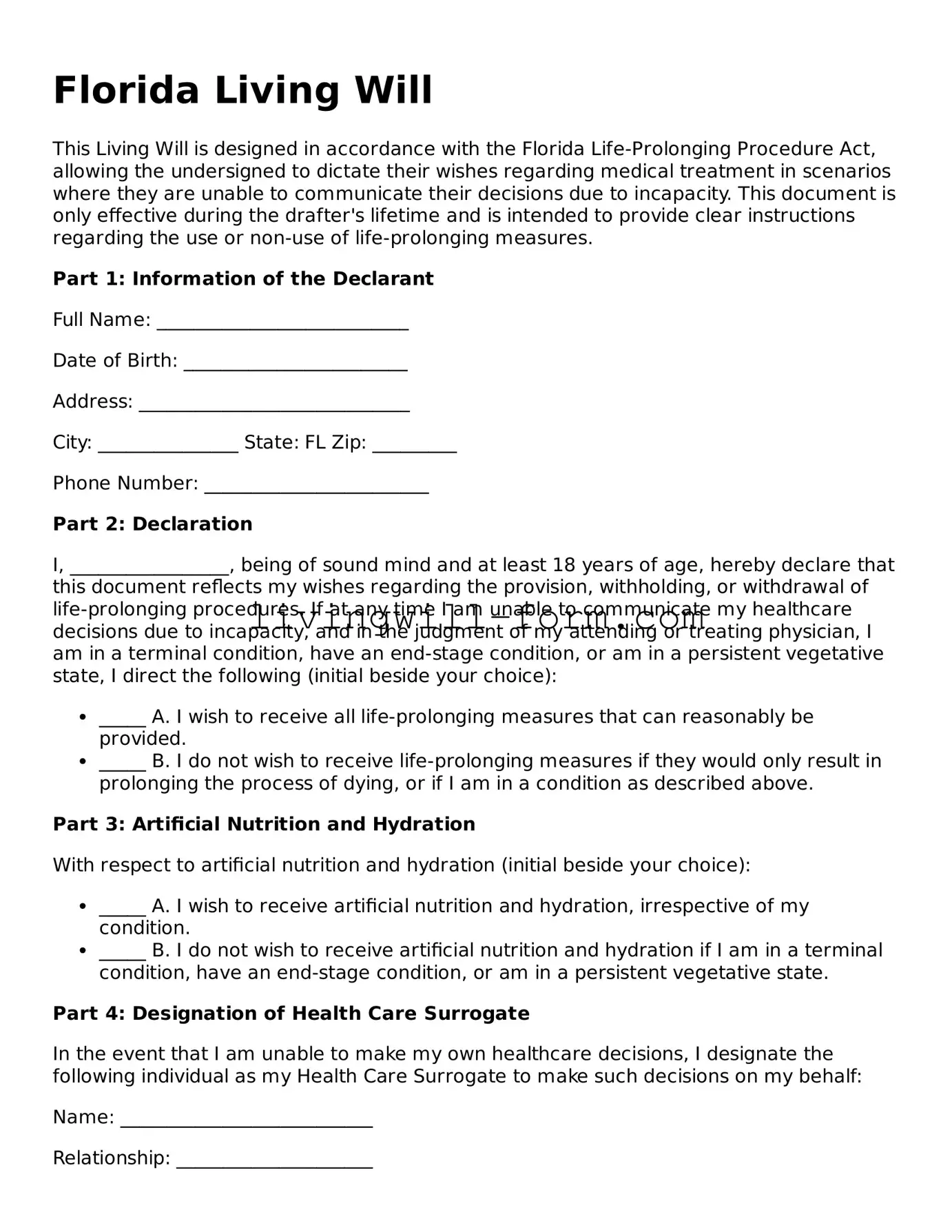Florida Living Will
This Living Will is designed in accordance with the Florida Life-Prolonging Procedure Act, allowing the undersigned to dictate their wishes regarding medical treatment in scenarios where they are unable to communicate their decisions due to incapacity. This document is only effective during the drafter's lifetime and is intended to provide clear instructions regarding the use or non-use of life-prolonging measures.
Part 1: Information of the Declarant
Full Name: ___________________________
Date of Birth: ________________________
Address: _____________________________
City: _______________ State: FL Zip: _________
Phone Number: ________________________
Part 2: Declaration
I, _________________, being of sound mind and at least 18 years of age, hereby declare that this document reflects my wishes regarding the provision, withholding, or withdrawal of life-prolonging procedures. If at any time I am unable to communicate my healthcare decisions due to incapacity, and in the judgment of my attending or treating physician, I am in a terminal condition, have an end-stage condition, or am in a persistent vegetative state, I direct the following (initial beside your choice):
- _____ A. I wish to receive all life-prolonging measures that can reasonably be provided.
- _____ B. I do not wish to receive life-prolonging measures if they would only result in prolonging the process of dying, or if I am in a condition as described above.
Part 3: Artificial Nutrition and Hydration
With respect to artificial nutrition and hydration (initial beside your choice):
- _____ A. I wish to receive artificial nutrition and hydration, irrespective of my condition.
- _____ B. I do not wish to receive artificial nutrition and hydration if I am in a terminal condition, have an end-stage condition, or am in a persistent vegetative state.
Part 4: Designation of Health Care Surrogate
In the event that I am unable to make my own healthcare decisions, I designate the following individual as my Health Care Surrogate to make such decisions on my behalf:
Name: ___________________________
Relationship: _____________________
Address: _________________________
City: _______________ State: FL Zip: _________
Phone Number: ___________________
If my primary Health Care Surrogate is unavailable, unwilling, or unable to serve, I designate the following individual as an alternate Health Care Surrogate:
Name: ___________________________
Relationship: _____________________
Address: _________________________
City: _______________ State: FL Zip: _________
Phone Number: ___________________
Part 5: Signature
This Living Will shall be effective immediately upon my signature and remain in effect until I revoke it. I understand that I may revoke or alter this document at any time.
Declarant's Signature: _______________________ Date: _________
Witness Signature: __________________________ Date: _________
Print Name of Witness: _______________________
Part 6: Statement of Witnesses
We, the undersigned witnesses, declare that the declarant voluntarily signed this document in our presence, appears to be of sound mind, and under no duress or undue influence. We are not the designated Health Care Surrogate, nor are we directly involved in providing healthcare to the declarant. Furthermore, we are not related to the declarant by blood, marriage, or adoption, and to the best of our knowledge, are not entitled to any part of the estate of the declarant.

